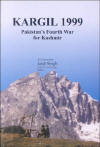|
| Home | About Kashmir Herald | |
Volume 1, No. 9 - February 2002 |
|
| Kashmiri Pandits - Victims of Power-Politics |
|
|
|
Kashmiri Pandits - Victims of Power-Politics The world’s richest democracy spurns the largest of its kind and sidles up to a usurper of democracy. The history of US involvement in South Asia could fill pages of Ripley's "Believe It Or Not". In 1971, fleeing the ethnic cleansing by the Pakistani army, the flood of Bengali refugees to India drew only one response from the Big Brother. The Seventh Fleet hovered around the Bay of Bengal. One would think that these huge war toys would have come to the rescue of the suffering Bangladeshis who were facing a holocaust at the hands of Pakistani army. Not by a long shot. This display of arrogant military might was to deter India from helping in the freedom struggle of Bangladesh. It is a different matter that India, with all its weaknesses, has one strength which this great nation has demonstrated repeatedly. This sleeping giant wakes up when threatened. The result was the unprecedented surrender of the whole of Pakistani army in Bangladesh, all 93,000 of them. We could have built on that success. But we went off to sleep again as the American warships moved away. There was another exodus, courtesy Pakistan, more than a decade ago. Shaken by the ethnic cleansing carried on by the mercenaries from Pakistan, the Kashmiri Pandits flew from their homeland of 5000 years. It was not a trickle which could be ignored by anyone in the world. In sheer numbers, they were more than Muslim refugees from Bosnia. The conflict in the Balkans filled our newspapers and television screens, the images of refugees shook our hearts and the world responded with force against the Serbians. That response continues till today with the Serb leaders facing a war-crime Tribunal. Yet, the Kashmiri Pandits' is a forgotten forced Diaspora, ignored by the world and ignored by their own country. They continue to live in tattered tents in Jammu, facing the cold weather and colder humanity with a fortitude which mocks at the geopolitics-based response to human misery. The UN is silent and UNHCR look the other way even while praising Musharraf’s sham speeches. While the world is deaf to the cries of pain and misery of the Hindu migrants from Kashmir valley, the same world is more than willing to listen to noble words from the mouth of the Pakistani President without asking him a few inconvenient questions like the following:
These are only a few questions for a beginning. There is little hope that the US administration will pose these to any Pakistani ruler, primarily because these have obvious answers. But the world of international politics is not inconvenienced by not asking inconvenient questions. The Hindu migrants from Kashmir will have to wait with their questions for a day when Pakistan becomes inconvenient for the US. [R. N. Prashar is an Indian Administrative Service Officer, presently posted as Commissioner and Secretary, Transport Department, and Member, Sales Tax Tribunal, Haryana, India.] |
 |
 |
 |
|
| Archives
| Privacy Policy |
Copyrights
| Contact
Us | |
||